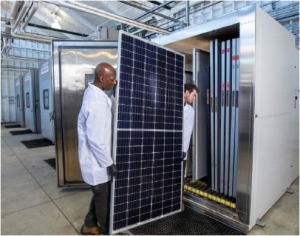 Module failure rates are on the rise, with one in three experiencing junction box failures. Image: PVEL.
Module failure rates are on the rise, with one in three experiencing junction box failures. Image: PVEL.
A total of 117 modules from 26 manufacturers have received ‘Top Performer’ status within PV Evolution Labs’ (PVEL) 2021 Module Reliability Scorecard, however the report has also highlighted an increase in failure rates within the industry.
The scorecard, published today, highlights findings from PVEL’s PV Module Product Qualification Program (PQP), scoring solar modules following the results of various testing procedures, including thermal cycling, damp heat and LID/LeTID sensitivity. It is designed to provide empirical data for module manufacturer benchmarking, while also providing insight for the upstream solar industry.
Now in its seventh year, the scorecard can equally act as barometer for tracking solar module failure rates, and this year’s edition highlights a sharp increase in the instances of certain failures observed by PVEL.
Perhaps most notably, one in three manufacturers participating in this year’s PQP experienced safety failures relating to junction box defects, an increase from one in five which experienced such failures last year. Furthermore, the majority of these failures were observed prior to testing, essentially straight from the box.
There was also an increase in the failure rate within the bills of material (BOMs). Around 26% of the BOMs eligible for this year’s scorecard had at least one failure, compared to 20% recognised in last year’s edition.
The greatest number of failures occurred during the mechanical stress sequence, added to PVEL’s PQP for this year to address durability concerns relating to extreme weather.
There were, however, positive takeaways from this year’s scorecard. The highest number of manufacturers have been listed within the scorecard’s seven-year history, while there has been a continued improvement in both module performance during thermal cycling and PAN performance.
PVEL said issues with reliability identified by the PQP could compromise performance gains achieved through technical advances. “The preventable safety failures observed in this year’s Scorecard underscore the complex challenges that manufacturers face as they race to meet demand in a highly dynamic global market,” Jenya Meydbray, CEO at PVEL, said.
Participation in PVEL’s PQP and scorecard is voluntary. To be eligible for inclusion, manufacturers must complete a factory witness test within 18 months of 2021, submit BOMs to all test sequences and have submitted at least two factory-witnessed PV module samples per test sequence. Only modules that report degradation of less than 2% in each reliability test sequence are granted ‘Top Performer’ status, and top performers must also finish in the top quartile for energy yield.
The complete scorecard has been made available in both an online digital format and via downloadable PDF at www.modulescorecard.pvel.com.
In addition, PVEL is co-hosting a webinar alongside PV Tech to discuss the findings from this year’s scorecard later today. Registration is still open, and further details on how to attend can be found here. A webinar of the recording will be made available at a later date.
Tara Doyle, chief commercial officer at PVEL, said the scorecard demonstrated that while the quality of a PV module was dictated at least in part by the materials it contains, many buyers do not currently request BOM details.
“Between supply chain instability and the ever-present push for lower prices, one cannot assume that every module sold under a given model type uses tested BOM components. Buyers must specify their desired BOM in supply contracts to achieve this,” Doyle said.
‘Tremendous accomplishment’
Trina Solar is one of just two companies, the other being fellow ‘Solar Module Super League’ member JinkoSolar, to have received Top Performer status in all seven editions of PVEL’s module scorecard, a feat described by PVEL head of PV module business Tristan Erion-Lorico as a “tremendous accomplishment”.
Cao Bo, deputy general manager at Trina Solar, added: “With more than 20 years’ accumulation of technical know-how, Trina Solar is committed to sustainability through the delivery of high power, highly efficient and top-performing modules with proven quality and reliability.”
Of the manufacturers to have been recognised in the 2021 version of PVEL’s scorecard, Indian solar manufacturer Adani secured Top Performer status for the fourth consecutive year having been recognised in each edition since 2018.
Ramesh Nair, chief executive officer at Adani Solar, said the scorecard was an “invaluable” tool used throughout the sector to ensure projects come forward with reliable and durable products. “Four wins in a row for Adani Solar is a testament to our manufacturing excellence and reflects on our commitment to produce Solar PV Cells & Modules while ensuring highest quality, bankability & reliability,” Nair said.
Boviet Solar Technology, a US-headquartered solar manufacturer originally founded in Vietnam, was recognised for a third successive year and the company highlighted its particular award in the potential induced degradation (PID) category. “PID is becoming a major concern in the industry. Being named one of the most reliable manufacturers in the PID category is a testament to Boviet’s high-quality design, high-quality components and meticulous manufacturing process,” Sienna Sen, president at Boviet Solar USA, said.






